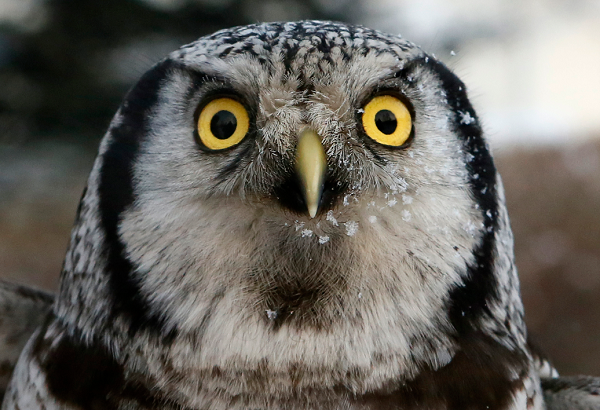Obese Owl Released Into The Wild After Losing Some Weight

An extremely obese owl that was found by a British sanctuary was released back into the wild after making it follow a strict diet.
The Suffolk Owl Sanctuary, on England’s east coast, found the obese owl in a ditch unable to fly. They initially assumed the owl was unable to fly because of some kind of injury, however, they later understood its flight was impeded simply because of its weight.
“This soggy little owl was found in a ditch a few weeks ago,” the sanctuary wrote on Twitter a few weeks ago. “Usually in these instances, we assume injury of sorts that is preventing the owl from flying - occasionally becoming wet causes them to become grounded too - so you can imagine our surprise that when we examined her, we found her to simply be extremely obese!”
This soggy little owl was found in a ditch. Usually we’d assume injury preventing the owl from flying - occasionally becoming wet causes them to become grounded - so you can imagine our surprise that we simply found her to simply be obese!https://t.co/nh8BicH85T
— Suffolk Owls (@suffolkowls) January 29, 2020
The owl, which was named Plump, weighed just over 245 grams (half a pound), which is about one-third more than most owls of her species and age, KARE -TV reported. As the natural cases of obesity were rare, the sanctuary observed Plump to see if it had escaped from some kind of captivity.
However, on further investigation, they became confident that obesity, in this case, was natural. An especially warm winter on the east coast meant that the owl had plenty of field mice and voles to gorge on, making her so fat that she was unable to fly.
Plump was then immediately put on a strict diet by the staff in the sanctuary. She was also encouraged to exercise on a regular basis. As a result, she was able to lose 30 grams in a period of two weeks.
At the end of her rehabilitation period, when she was able to fly properly, the Suffolk Sanctuary staff released her into the wild again.
Wow…what a little star Plump has turned out to be!
— Suffolk Owls (@suffolkowls) January 30, 2020
Here she is upon release, flying gracefully off into the British countryside at a much healthier, and happier weight. pic.twitter.com/R50L7hEGUD
“Wow…what a little star Plump has turned out to be! Here she is upon release, flying gracefully off into the British countryside at a much healthier, and happier weight,” the caption for the video posted on Twitter by the sanctuary read.
© Copyright IBTimes 2025. All rights reserved.





















